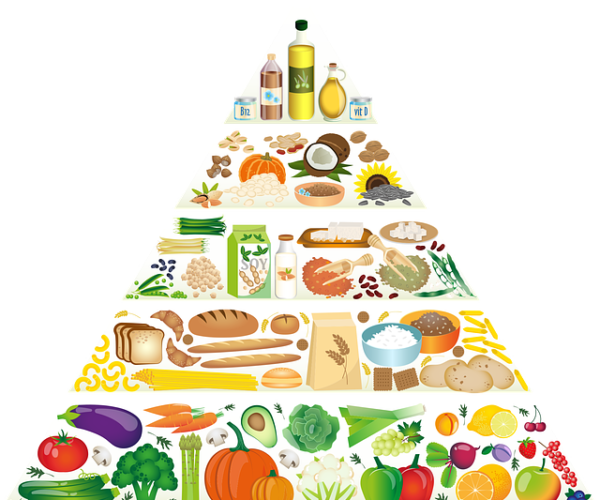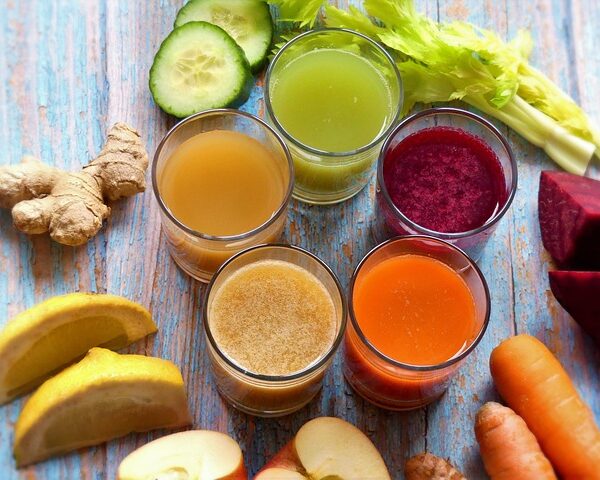Reducing inflammation is a great place to start if you want to improve your health. Inflammation is the body’s natural response to injury or infection; however, chronic inflammation can contribute to a variety of health problems, including cardiovascular disease, diabetes, and arthritis.
Thankfully, there are numerous nutrients that can reduce inflammation in the body. Incorporating more anti-inflammatory items into your diet is a crucial strategy for dietary anti-inflammation. These include antioxidant-rich fruits and vegetables, such as vitamin C and beta-carotene, and healthful fats found in nuts and fatty fish.
By making basic dietary changes and selecting these anti-inflammatory foods, you may be able to reduce your risk for chronic diseases and feel better in general.
Understanding The Effects Of Inflammation On The Human Body
 Inflammation is a natural response of the body to injury or infection, but when it becomes chronic, it can contribute to long-term health issues such as heart disease, arthritis, and even cancer.
Inflammation is a natural response of the body to injury or infection, but when it becomes chronic, it can contribute to long-term health issues such as heart disease, arthritis, and even cancer.
However, were you aware that inflammation can also impact your mental health? Chronic inflammation may contribute to depression and anxiety by modifying brain function and decreasing neurotransmitter production, according to studies. This emphasises the need for us to consider not only our physical health, but also our mental health.
Therefore, what nutrients can reduce inflammation in the body? The Mediterranean diet is an excellent starting point. This diet, which is rich in fruits, vegetables, whole grains, lean proteins such as salmon and chicken, nuts, seeds, olive oil, and herbs and spices such as turmeric and ginger, has been shown to reduce blood levels of inflammatory markers.
Incorporating these nutrients into your diet, along with regular exercise, can contribute significantly to your overall health and wellness.
Incorporating Fruits And Vegetables Rich In Antioxidants
After gaining a comprehension of how inflammation affects the body, it is essential to learn which foods can help alleviate this condition.
Include antioxidant-rich fruits and vegetables in your diet as a good starting point.
Smoothie recipes loaded with anti-inflammatory ingredients are one of the most convenient methods to incorporate these nutrients into your daily diet. Consider blending spinach, berries, ginger, and turmeric to create a delectable and nutritious beverage. For an added boost, you can also add nutritious fats like avocado or nuts.
Incorporating more anti-inflammatory ingredients into your diet can also be facilitated by meal preparation ideas. Consider preparing a large batch of quinoa or brown rice at the start of the week and serving it with roasted vegetables like sweet potatoes, broccoli, and bell peppers. Thus, you will have a ready-to-eat supper that is both nutritious and delicious.
By focusing on incorporating more antioxidant-rich fruits and vegetables into your meals via smoothies and meal prep ideas, you are taking preventative measures to reduce inflammation in your body.
Remember to always prioritise whole foods over processed options in order to obtain optimal nutrition from the foods you consume.
Selecting Healthful Fats For Anti-Inflammatory Advantages
Selecting Healthful Fats for Anti-Inflammatory Effects
Healthy lipids are an essential component for reducing inflammation in the body. Not all lipids are created equal, and unhealthy fats can contribute to inflammation when consumed. However, including healthful fat sources in your diet can have anti-inflammatory effects.
Omega-3 fatty acids are a vital form of healthy fat. These are present in fatty fish like salmon, mackerel, and sardines. Included among the plant-based sources are chia seeds, flaxseeds, and hazelnuts. Omega-3 fatty acids have been shown to reduce inflammation in the body and may even contribute to better joint health.
Other healthy lipids include monounsaturated and polyunsaturated fats, in addition to omega-3s. These are present in avocado, nuts (such as almonds and pistachios), olive oil, and seeds (such as sunflower and pumpkin).
Incorporating these nutritious fats into your diet not only reduces inflammation, but also provides a variety of other health benefits.
Including Herbs And Spices In Your Meals
Now that we’ve discussed the importance of selecting healthy fats for their anti-inflammatory properties, let’s move on to another method you can reduce inflammation in your body through diet. Adding herbs and seasonings to meals is a simple yet effective method.
Turmeric is a spice worth emphasising. This vibrant yellow spice contains curcumin, a compound with potent anti-inflammatory properties. According to studies, consuming turmeric may mitigate the symptoms of conditions such as arthritis, asthma, and even cancer. Try incorporating turmeric into soups, stews, or roasted vegetables to receive its benefits. Also, you can create golden milk by combining turmeric powder with warm almond milk and honey.
Ginger is another ingredient that can help reduce inflammation. Ginger contains anti-inflammatory compounds referred to as gingerols and shogaols. In addition to its anti-inflammatory properties, ginger has been demonstrated to improve digestion, alleviate vertigo, and reduce cholesterol levels.
Consider grating fresh ginger into stir-fries or smoothies, or steeping sliced ginger in hot water to make a soothing beverage.
Incorporating these spices into your dishes not only imparts flavour, but also provides a variety of health benefits. Today, you should consider incorporating more ginger and turmeric into your diet.
Avoiding Processed And Sugar-Rich Foods
Did you know that foods that are highly processed and high in sugar can induce inflammation in the body? In fact, studies have linked diets high in sugar and processed foods to an increase in inflammatory markers. This indicates that avoiding these types of nutrients is a crucial step in reducing inflammation.
Fruits, vegetables, nuts, seeds, and lean proteins are whole, unprocessed foods that are healthy alternatives to processed and high-sugar foods. These alternatives provide essential nutrients without the sugars and chemicals present in many processed foods.
Incorporating natural sweeteners such as honey or maple syrup can also help satiate a sweet tooth without the addition of refined sugar. In moderation, sugar substitutes such as stevia or monk fruit extract can be used as healthier alternatives to traditional table sugar.
It is crucial to remember, however, that even natural sweeteners should be consumed in moderation, as excessive sweetness can still have negative health effects. By making minor adjustments, such as selecting whole foods over highly processed ones and opting for natural sweeteners when necessary, we can make substantial progress in reducing inflammation in our bodies.
Probiotic-Rich Foods And Gut Health
Fermented foods are an excellent method to increase your gut microbiome, which can improve your immunity.
The gut is home to trillions of microbes that play a crucial role in the maintenance of overall health and wellness.
Good bacteria found in probiotic-rich foods such as yoghurt, kefir, kimchi, sauerkraut, and kombucha can facilitate digestion by breaking down food particles.
Anti-inflammatory properties of probiotics allow them to effectively reduce inflammation throughout the body. Inflammation is the underlying cause of numerous chronic diseases, including cardiovascular disease, type 2 diabetes, arthritis, and some malignancies.
Regular consumption of probiotic-rich foods supports immunity and promotes healthy ageing.
It is important to note that not all fermented foods contain active cultures or probiotics, so it is best to carefully read labels when selecting products.
Incorporating these types of foods into your diet may require some adjustment, but doing so in small quantities on a regular basis may improve your health in the long run.
Formulating Nutrient-Rich, Balanced Meals For Optimal Health
I frequently encounter clients who struggle to create optimally balanced and nutrient-dense meals. Meal preparation and timing of nutrient intake are essential components for attaining this objective.
By selecting foods that align with your personal preferences and dietary needs, you can ensure that your body is receiving the nutrients it needs to function optimally.
It is also essential to include healthful substitutions in your meal plan. Consider substituting olive oil or avocado oil for butter as a culinary fat, for instance.
In addition, portion control is essential for maintaining a healthy diet. Be mindful of portion sizes when preparing meals and strive to fill half of your plate with non-starchy vegetables.
Incorporating these practises into your daily routine will not only improve your overall health, but they may also reduce inflammation in the body over time.
Remember that producing balanced, nutrient-dense meals does not need to be difficult or time-consuming; small changes can have a significant impact. Therefore, begin today by taking the initial step towards optimising your health through diet!
Can Certain Foods Cause Inflammation?
Certain foods, particularly those that induce food sensitivities, can cause inflammation. In order to reduce inflammation in the body, an anti-inflammatory diet is frequently advised.
The anti-inflammatory diet emphasises whole, nutrient-dense foods such as fruits, vegetables, lean proteins, healthy fats, and whole carbohydrates while avoiding processed and refined foods. By adhering to this type of diet, you can reduce inflammation and potentially alleviate chronic health condition symptoms.
Noting that everyone’s body reacts differently to certain foods is essential, and identifying your own food sensitivities through elimination diets or testing can also play an important role in reducing inflammation.
Are there specific teas that can aid in reducing inflammation?
Herbal remedies have been utilised for centuries to treat numerous health conditions, including inflammation.
Particular infusions have been identified as having anti-inflammatory properties that can help reduce inflammation throughout the body.
It has been demonstrated that ginger tea contains compounds that reduce the production of pro-inflammatory molecules.
Similarly, turmeric tea contains curcumin, a compound with potent anti-inflammatory properties.
Incorporating these herbal infusions into your daily routine may be an effective way to manage inflammation naturally and enhance your overall health.
Before adding any new supplements or herbs to your diet, it is always essential to consult a healthcare professional.
How does stress affect the body’s inflammatory response?
It is essential to comprehend the relationship between tension and inflammation in the body.
Chronic tension triggers the release of cortisol, a hormone that increases inflammation levels.
Incorporating exercise into your daily routine has been demonstrated to reduce inflammation and tension.
In addition, there is a strong correlation between digestive health and inflammation; a balanced diet rich in fibre and probiotics can help promote gut health and combat inflammation.
By prioritising self-care practises such as exercise and healthy nutrition, we can reduce overall inflammation in our bodies and improve our long-term health.
Can supplements aid in inflammation reduction?
It has been demonstrated that turmeric and omega-3 fatty acids are anti-inflammatory supplements.
Curcumin, which is present in turmeric, has been shown to reduce inflammation in the body.
By inhibiting certain inflammatory pathways, omega-3 fatty acid supplements, which are frequently derived from fish oil, can also be beneficial in reducing inflammation.
While these supplements may provide some relief for those suffering from inflammation, it is important to note that they should not replace a healthy diet high in anti-inflammatory foods.
Are there any foods that should be avoided due to their pro-inflammatory properties?
While it is true that some foods can help reduce inflammation, it is equally essential to consider the potential negative effects of other foods on our bodies.
Due to their pro-inflammatory properties, processed and high-sugar foods should be strictly avoided. These foods are associated with chronic diseases such as heart disease, diabetes, and cancer.
Focus instead on incorporating whole fruits and vegetables, healthy fats (such as omega-3s found in fatty salmon), and lean proteins into your diet to aid in reducing inflammation and promoting overall health.
Whenever practicable, I always advise my clients to prioritise nutrient-dense whole foods over highly processed options.
Consuming anti-inflammatory nutrients can significantly reduce inflammation in the body. It is essential to note that certain foods, such as those high in sugar and saturated fats, may actually exacerbate inflammation.
Studies indicate that consuming one cup of green tea per day can reduce inflammatory markers in the body by up to 25 percent.
This straightforward addition to your daily routine can provide significant health and well-being benefits.
My advice is to prioritise whole, nutrient-dense foods, such as fruits, vegetables, lean proteins, and healthy lipids, while avoiding processed and inflammatory options.
Incorporating stress-relieving practises such as yoga or meditation can also aid in reducing the body’s inflammation levels.
By incorporating these dietary and lifestyle changes, we can work towards achieving optimal health and vitality.











